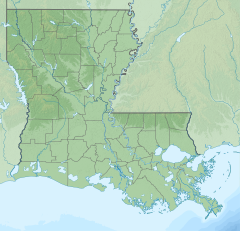| Rigolets | |
|---|---|
 The abandoned West Rigolets Light in 2004. It was destroyed by Hurricane Katrina in 2005. | |
 NOAA Coast Survey nautical map 2016 | |
| Location | |
| Country | United States |
| State | Louisiana |
| Physical characteristics | |
| Source | Lake Pontchartrain |
| • coordinates | 30°10′40″N 89°44′40″W / 30.177778°N 89.744444°W |
| Mouth | Lake Borgne |
• coordinates | 30°09′16″N 89°37′31″W / 30.154444°N 89.625278°W |
| Length | 8 mi (13 km) |
| Basin features | |
| Tributaries | |
| • left | Old Pearl River |
| • right | Sawmill Pass |
Rigolets is a 12.9-kilometre-long (8.0 mi) deepwater strait in Louisiana. "Rigolets" comes from the word rigole, French for 'trench' or 'gutter'. The name is now locally pronounced "RIG-uh-leez".
The strait begins at 30°10′40″N 89°44′40″W / 30.17778°N 89.74444°W and follows a generally eastward course to Lake Borgne, a lagoon in the Gulf of Mexico, and finally to the Gulf of Mexico, where it ends at 30°09′16″N 89°37′31″W / 30.15444°N 89.62528°W. Along with nearby Chef Menteur Pass, the Rigolets connects Lake Pontchartrain and Lake St. Catherine in Louisiana to Lake Borgne, and then to the Gulf of Mexico.[1][2] It forms the boundary between New Orleans (Orleans Parish) and St. Tammany Parish.
Tidal pass
[edit]As a deepwater tidal pass, the Rigolets helps supply salt water from the Gulf to Lake Pontchartrain.[3] Tidal scouring has produced a deep pit in the lake at the western mouth of the strait.[4] Since the Rigolets is a channel through which Gulf storm surges can approach the New Orleans area, there have been proposals to construct floodgates to try to protect the city, especially since the destructiveness of hurricanes in the early 21st century.[5]
Fort Pike
[edit]
The United States constructed Fort Pike following the War of 1812 to protect passage on the Rigolets.[6] The fort was abandoned in 1890 when it was no longer considered necessary.
Bridges
[edit]The Rigolets is spanned by two bridges. The western terminus of the U.S. Route 90 Rigolets Bridge is located immediately north of Fort Pike. It was damaged by Hurricane Katrina in August 2005, and required major repairs.[7] Farther south, CSX Transportation crosses the Rigolets on a 1,388-meter (4,555-ft) railroad bridge.[8] Hurricane damage there from Katrina included shifted spans and the loss of timber decking.[9]
References
[edit]- ^ "The Rigolets". USGS Geographic Names Information System. Archived from the original on 2024-04-24. Retrieved 2006-04-17.
- ^ "Comprehensive Habitat Management Plan for the Lake Pontchartrain Basin" (PDF). Lake Pontchartrain Basin Foundation. 2005-11-18. Archived from the original (PDF) on 2006-03-16. Retrieved 2006-04-15.
- ^ "Martello Castle Background Information". Wetland Education through Maps and Aerial Photography. Chadron State College & USGS - National Wetlands Research Center. Archived from the original on 2005-05-04. Retrieved 2006-04-17.
{{cite web}}: CS1 maint: unfit URL (link) - ^ Connor, Paul, Jr.; Maygarden, Dinah; Penland, Shea. "Basin Geology - Bathymetry: Bathymetric Map of Lake Pontchartrain, Louisiana". Environmental Atlas of the Lake Pontchartrain Basin. Center for Coastal & Regional Marine Studies, Coastal & Marine Geology Program. USGS Open File Report 02-206. Archived from the original on 2023-12-01. Retrieved 2006-04-17.
{{cite web}}: CS1 maint: multiple names: authors list (link) - ^ "Full flood safety in New Orleans could take billions and decades". Louisiana Dept. of Natural Resources. Archived from the original on 2006-07-18. Retrieved 2006-04-17.
- ^ "Fort Pike (Hwy 11, Slidell, LA, USA)". Louisiana State Historical Marker; Listed in the National Register of Historic Places. StoppingPoints.com. July 27, 2009. Archived from the original on 2012-02-29. Retrieved 2024-04-24.
- ^ "DOTD inspects movable bridges in hurricane-affected area" (Press release). Louisiana Dept. of Transportation & Development. 2005-09-07. Archived from the original on 2006-02-23.
- ^ Judge, Tom (November 2005). "Bridging to recovery: a massive effort to rebuild six major bridges following Hurricane Katrina's devastation is now under way on CSXT's Gulf Coast main trunk". Railway Age. Vol. 206, no. 11. Bristol: Simmons-Boardman Publishing Corporation. pp. 46–47. eISSN 2161-511X. ISSN 0033-8826. ProQuest 203841248, EBSCOhost 18853297, Gale A139344784, Factiva RWA0000020051203e1b100013. Archived from the original on 2006-02-10.
- ^ "Restoring Katrina-ravaged bridges". Railway Track and Structures. Archived from the original on March 14, 2006. Retrieved 2006-04-15.
